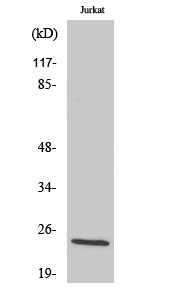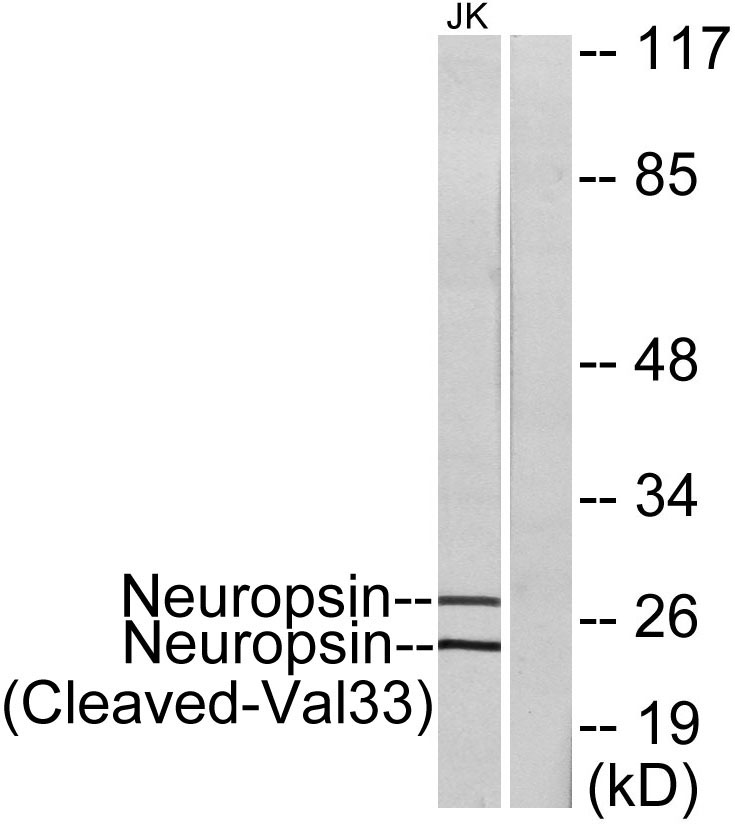Cleaved-KLK8 (V33) Polyclonal Antibody
- Catalog No.:YC0056
- Applications:WB;ELISA
- Reactivity:Human;Rat;Mouse;
- Target:
- KLK8
- Gene Name:
- KLK8
- Protein Name:
- Kallikrein-8
- Human Gene Id:
- 11202
- Human Swiss Prot No:
- O60259
- Mouse Swiss Prot No:
- Q61955
- Immunogen:
- The antiserum was produced against synthesized peptide derived from human Neuropsin. AA range:14-63
- Specificity:
- Cleaved-KLK8 (V33) Polyclonal Antibody detects endogenous levels of fragment of activated KLK8 protein resulting from cleavage adjacent to V33.
- Formulation:
- Liquid in PBS containing 50% glycerol, 0.5% BSA and 0.02% sodium azide.
- Source:
- Polyclonal, Rabbit,IgG
- Dilution:
- WB 1:500 - 1:2000. ELISA: 1:10000. Not yet tested in other applications.
- Purification:
- The antibody was affinity-purified from rabbit antiserum by affinity-chromatography using epitope-specific immunogen.
- Concentration:
- 1 mg/ml
- Storage Stability:
- -15°C to -25°C/1 year(Do not lower than -25°C)
- Other Name:
- KLK8;NRPN;PRSS19;TADG14;Kallikrein-8;hK8;Neuropsin;NP;Ovasin;Serine protease 19;Serine protease TADG-14;Tumor-associated differentially expressed gene 14 protein
- Observed Band(KD):
- 24kD
- Background:
- Kallikreins are a subgroup of serine proteases having diverse physiological functions. Growing evidence suggests that many kallikreins are implicated in carcinogenesis and some have potential as novel cancer and other disease biomarkers. This gene is one of the fifteen kallikrein subfamily members located in tandem in a gene cluster on chromosome 19. The encoded protein may be involved in proteolytic cascade in the skin and may serve as a biomarker for ovarian cancer. Alternate splicing of this gene results in multiple transcript variants encoding different isoforms. [provided by RefSeq, Jul 2013],
- Function:
- catalytic activity:Cleavage of amide substrates following the basic amino acids Arg or Lys at the P1 position, with a preference for Arg over Lys.,enzyme regulation:Inhibited by a range of serine protease inhibitors including antipain, aprotinin, leupeptin, benzamidine and soybean trypsin inhibitor.,function:Serine protease which is capable of degrading a number of proteins such as casein, fibrinogen, kininogen, fibronectin and collagen type IV. Also cleaves L1CAM in response to increased neural activity. Induces neurite outgrowth and fasciculation of cultured hippocampal neurons. Plays a role in the formation and maturation of orphan and small synaptic boutons in the Schaffer-collateral pathway, regulates Schaffer-collateral long-term potentiation in the hippocampus and is required for memory acquisition and synaptic plasticity. Involved in skin desquamation and keratinocyte proliferati
- Subcellular Location:
- Secreted . Cytoplasm . Shows a cytoplasmic distribution in the keratinocytes.
- Expression:
- Isoform 1 is predominantly expressed in the pancreas. Isoform 2 is expressed in adult brain and hippocampus. Isoform 1 and isoform 2 are found in fetal brain and placenta. Detected in salivary gland, uterus, thymus, breast, testis and kidney but not in spleen, liver, lung or normal ovarian tissue. Displays an 11.5-fold increase in Alzheimer disease hippocampus compared to controls and is overexpressed in some ovarian carcinomas. Expressed at low levels in normal skin while high levels are found in psoriasis vulgaris, seborrheic keratosis, lichen planus and squamous cell carcinoma skin samples. Expressed in the keratinocytes.
- June 19-2018
- WESTERN IMMUNOBLOTTING PROTOCOL
- June 19-2018
- IMMUNOHISTOCHEMISTRY-PARAFFIN PROTOCOL
- June 19-2018
- IMMUNOFLUORESCENCE PROTOCOL
- September 08-2020
- FLOW-CYTOMEYRT-PROTOCOL
- May 20-2022
- Cell-Based ELISA│解您多样本WB检测之困扰
- July 13-2018
- CELL-BASED-ELISA-PROTOCOL-FOR-ACETYL-PROTEIN
- July 13-2018
- CELL-BASED-ELISA-PROTOCOL-FOR-PHOSPHO-PROTEIN
- July 13-2018
- Antibody-FAQs
- Products Images

- Western Blot analysis of various cells using Cleaved-KLK8 (V33) Polyclonal Antibody

- Western blot analysis of lysates from Jurkat cells, treated with etoposide 25uM 24h, using Neuropsin (Cleaved-Val33) Antibody. The lane on the right is blocked with the synthesized peptide.



